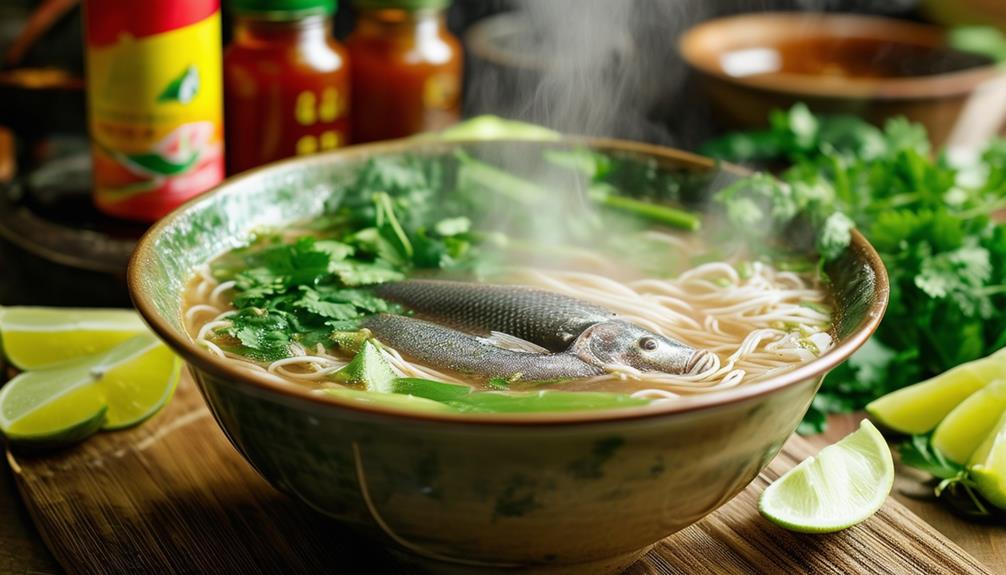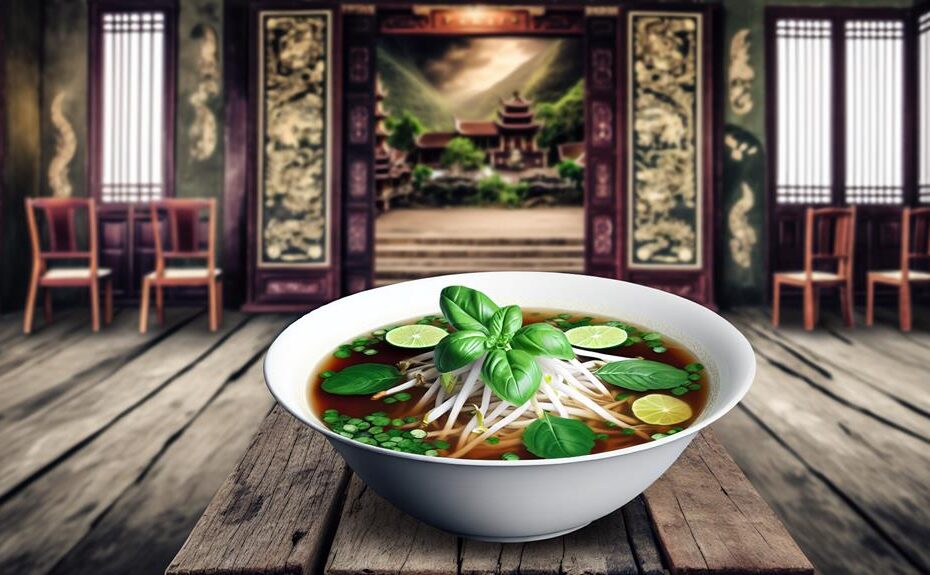As you slurp down a steaming bowl of pho, you might assume it's a vegan-friendly option, but think again. You've probably savored the rich, umami flavor without realizing the traditional Vietnamese soup often hides animal-derived ingredients. Even if you opt for a "vegetarian" pho, you might be surprised to find that fish sauce or beef broth are lurking beneath the surface. So, is pho truly vegan? The answer isn't as clear-cut as you'd think, and the truth might just change the way you approach this beloved dish.
Pho's Vegan Roots Explored
As you investigate the history of pho, you'll find that vegan pho originated as a creative response to traditional beef pho, with inventive chefs experimenting with plant-based ingredients to replicate the rich, savory flavors.
These forward-thinking chefs didn't just stop at imitation, though – they crafted a unique, vegan pho broth that's just as flavorful as its traditional counterpart. By combining ingredients like charred onions, ginger, and spices, they created a complex, layered flavor profile that's both familiar and new.
Vegetarian pho recipes played a significant role in this evolution, with the incorporation of ingredients like miso paste and Asian mushrooms to create bold, earthy flavors. The result is a vegan pho broth that's rich in umami flavor, thanks in part to the meaty texture of mushrooms.
As you immerse yourself further into the world of vegan pho, you'll encounter a rich, savory flavor that's both a tribute to traditional pho and a bold, plant-based statement.
Pho's Hidden Animal Products
As you venture into the world of pho, you'll find that regional styles, such as Northern, Central, and Southern Vietnamese pho, each have their own unique twists.
You might be surprised to realize that even the rice noodles and spices you thought were vegan-friendly can contain hidden animal products.
Let's take a closer look at these variations and uncover the hidden animal products that might be lurking in your favorite pho dish.
Regional Pho Styles Exist
As you venture into the world of pho, you'll find that regional variations can greatly impact the vegan-friendliness of this popular Vietnamese dish. From north to south, different regions in Vietnam have developed their own unique pho styles, each with their own set of ingredients and cooking techniques.
Let's take a closer look at some of the most well-known regional styles:
- Northern Vietnamese Style
- Central Vietnamese Style
- Southern Vietnamese Style
Northern Vietnamese Style
Delving into Northern Vietnamese style pho, you'll find that traditional recipes rely heavily on beef bones for the broth, making it a non-vegan option. This meat-based pho typically includes beef slices and tendon as toppings, making it unsuitable for vegans.
For a cruelty-free alternative, consider vegan pho, or 'pho chay,' which replaces animal products with plant-based ingredients for a delicious and vegan-friendly Vietnamese noodle soup.
Central Vietnamese Style
You'll find that Central Vietnamese style pho, unlike its Northern counterpart, often incorporates a richer, more complex broth made with a combination of beef and chicken bones.
This traditional, meat-based pho is far from vegan-friendly. However, modern variations have led to the development of vegetarian broth and vegan pho recipes, offering alternatives to traditional Vietnamese pho.
Southern Vietnamese Style
In Southern Vietnam, pho recipes typically call for beef broth and meat toppings, making this regional variation a non-starter for vegans.
You'll find beef bones, oxtail, and brisket simmered to create the rich flavor.
Some variations may use chicken or pork broth, making it even more non-vegan.
Rice Noodles and Spices
As you investigate the world of pho, you'll notice that rice noodles and spices play a vital role in creating the iconic Vietnamese dish.
But did you know that even in these seemingly harmless ingredients, there might be hidden animal products lurking?
Let's take a closer look at the spices you'll typically find in pho:
- Star Anise Pods
- Cinnamon Sticks for Warmth
- Fresh Thai Basil Leaves
Star Anise Pods
When savoring a steaming bowl of pho, the distinctive licorice flavor that permeates the broth is largely thanks to the star anise pods, a key ingredient that adds depth and warmth to this beloved Vietnamese dish. These plant-based spices contribute to the complex and aromatic profile of traditional pho broth, enhancing its authentic flavor.
| Characteristics | Star Anise Pods |
|---|---|
| Flavor Profile | Licorice, sweet, and slightly bitter |
| Origin | Derived from the Illicium verum plant |
| Role in Pho | Adds depth and warmth to the broth |
| Flavor Contribution | Complex and aromatic profile |
| Vegan Status | Plant-based and vegan-friendly |
Cinnamon Sticks for Warmth
You add cinnamon sticks to your pho broth to infuse it with warmth and depth of flavor.
But remember, while cinnamon sticks are vegan, other pho ingredients mightn't be.
Check your rice noodles and spice mixes for hidden animal products.
Opt for vegan-friendly versions to guarantee your pho aligns with your vegan dietary preferences.
Fresh Thai Basil Leaves
Fresh Thai basil leaves, a staple garnish in traditional pho, add a burst of herbal flavor to the dish while bringing an authentic and fragrant touch to the pho experience.
You'll notice their distinct, spicier, anise-like flavor profile, differing from sweet basil.
As a plant-based, vegan-friendly ingredient, Thai basil leaves enhance pho's aroma and flavor, making it a delightful inclusion.
Fish Sauce Lurks Within

As you delve into the world of pho, you'll find that fish sauce is a common ingredient in traditional recipes, adding a rich umami flavor to the broth.
But what about vegan pho? You might be surprised to learn that some vegan recipes may still include fish sauce, while others substitute it with soy sauce or other plant-based alternatives.
Let's examine the roles of honey and fish sauce in pho, and how they impact the vegan status of this popular Vietnamese dish.
Honey in Traditional Pho
When you delve into the ingredients of traditional pho, you'll find that honey is just the tip of the iceberg.
When you start to examine the broth, you'll uncover a trio of non-vegan components lurking beneath the surface.
Take a closer look at the following points:
- Beeswax in Traditional Broth
- Chicken or Beef Bones
- Oyster Extract in Broth
Beeswax in Traditional Broth
You might be surprised to find that beeswax, an unlikely ingredient, is sometimes added to traditional pho broth for an extra layer of richness and flavor. This non-vegan ingredient, like honey, is used as a sweetener. Beeswax and fish sauce are common non-vegan ingredients in traditional pho broth.
| Ingredient | Vegan-Friendly? |
|---|---|
| Beeswax | No |
| Honey | No |
| Fish Sauce | No |
| Vegan Pho Broth | Yes |
| Traditional Pho Broth | No |
Chicken or Beef Bones
When you explore traditional pho recipes, you'll often find that chicken or beef bones are used to create a rich, savory broth.
This non-vegan component gives traditional pho its signature flavor.
To make vegan pho, you can substitute these bones with plant-based ingredients, replicating the rich flavor without the animal products.
Oyster Extract in Broth
Traditional pho recipes often rely on oyster extract to create a savory broth, which can be a major obstacle for vegans looking to replicate this popular Vietnamese dish.
Oyster extract adds an umami flavor and seafood flavor, commonly found in fish sauce, a key component in authentic recipes. This traditional ingredient can make it challenging to create vegan variations, especially when paired with honey, another common ingredient.
Fish Sauce in Vegan Pho
As you investigate vegan pho options, you'll likely come across different alternatives to traditional fish sauce. These substitutes aim to replicate the umami flavor that fish sauce provides.
Some popular options include:
- Palm Sugar-Based Fish Sauce
- Mushroom-Based Umami Flavoring
- Kombu Seaweed Umami Enhancement
Palm Sugar-Based Fish Sauce
You might be surprised to learn that a clever substitute has been devised to replicate the umami flavor of traditional fish sauce in vegan pho, and it's centered around palm sugar. This vegan alternative combines palm sugar with soy sauce, seaweed, and mushrooms to create a depth of flavor that's both savory and authentic.
| Ingredient | Description |
|---|---|
| Palm sugar | Adds sweetness and depth to the broth |
| Soy sauce | Intensifies umami flavor |
| Seaweed | Provides a savory element |
| Mushrooms | Adds complexity to the flavor profile |
| Vegan pho broth | The result: a rich and authentic taste |
Mushroom-Based Umami Flavoring
By leveraging the natural umami flavor of mushrooms, vegan pho recipes cleverly elevate the savory depth of traditional fish sauce, bringing a rich, meaty flavor to the broth.
You'll often find shiitake mushrooms used to heighten the savory profile without animal products.
This mushroom-based umami flavoring provides a satisfying taste to vegan pho broth, substituting fish sauce while catering to a vegan diet.
Kombu Seaweed Umami Boost
When crafting vegan pho broth, kombu seaweed is often employed to replicate the umami flavor traditionally achieved with fish sauce, providing a surprisingly similar savory taste without the animal product.
This vegan-friendly ingredient is rich in glutamic acid, creating a rich broth that aligns with plant-based diets, while offering health benefits and authentic umami essence.
Spirulina-Based Umami Booster
Harnessing the power of spirulina, a blue-green algae, allows vegan pho enthusiasts to amplify the savory depth of traditional fish sauce, effectively bridging the flavor gap between plant-based and traditional pho broths. This umami intensifier heightens the depth of flavor in vegan pho, providing a rich and satisfying taste profile.
| Umami Intensifier | Vegan Pho Benefits | Sustainable Option |
|---|---|---|
| Spirulina | Rich, savory flavor | Nutrient-dense superfood |
| Plant-based diets | Aligns with vegan lifestyle | Healthy alternative |
| Fish sauce alternative | Depth of flavor | Sustainable choice |
| Vegan broth enhancer | Traditional pho taste | Eco-friendly option |
| Sustainable choice | Delicious, meat-free option | Aligns with eco-values |
Sustainable Pho for All
You can indulge in a guilt-free pho experience with Sustainable Pho for All, a groundbreaking approach that reimagines traditional pho soup as a plant-based, vegan-friendly culinary delight.
This creative concept focuses on creating a sustainable, eco-conscious version of pho that caters to diverse dietary preferences. By incorporating plant-based ingredients like mushrooms, vegetables, and spices, Sustainable Pho for All offers a flavorful and environmentally friendly alternative to traditional meat-based pho.
This approach guarantees that vegans, vegetarians, and those seeking sustainable meal options can enjoy a satisfying and hearty pho experience. By reducing the environmental impact of traditional pho recipes, Sustainable Pho for All promotes a more environmentally friendly way to enjoy this beloved dish.
With its emphasis on sustainable ingredients and practices, this approach makes pho accessible to a wider audience while fostering a more eco-conscious culinary culture.
Conclusion
You've now learned that traditional pho isn't vegan, thanks to hidden animal products like fish sauce. However, there's a silver lining: vegan pho is on the rise, offering a sustainable alternative that's just as flavorful.
By using plant-based ingredients like mushrooms and spices, vegan pho captures the essence of the classic Vietnamese soup while staying true to a vegan diet.
So, go ahead and indulge in this environmentally friendly delight, knowing you're making a conscious choice for yourself and the planet.
